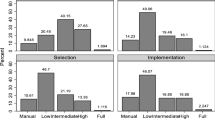Abstract
This paper argues for a new theoretical methodology that delivers ‘best bet’ decision outcomes in contexts where issues are contested. Governed by the procedural parameters of such a Generalised Decision Assurance Methodology, a multi-criteria decision modelling approach is proposed that allows for the identification of arbitrage possibilities that emerge at the interface between conflicting sets of interests. Such possibilities are then exploited to secure a solution set that is maximally justifiable to both parties.
Similar content being viewed by others
References
Barnes, B. “Power,” in Bellamy, R. (Ed.), (1993) Theories and Concepts of Politics; An Introduction. Manchester University Press, Manchester.
De Reuck, J., O. Schmidenberg, and D. Klass. (1999). “A Reconceptualisation of Decision Conferencing: Towards a Command Methodology,” International Journal of Technology Management 17 (1/2), 195–107.
De Reuck, J., O. Schmidenberg, and D. Klass. (2000a). “The Logic of a Command Methodology: Decision Conferencing Reconceptualized,” International Journal of Management and Decision Making 1 (1), 2–13.
De Reuck, J., O. Schmidenberg, and D. Klass. (2000b). “Reflections on Group Support Systems Facilita-tion,” Proceedings of the Unpublished Paper Presented at the Strategic Decision Support Consortium, Perth.
De Reuck, J., O. Schmidenberg, and D. Klass. (2003). “General Decision Assurance Principles and Procedures for Strategic Planning,” International Journal of Management and Decision Making 3 (1).
Habermas, J. (1970). “Toward a Theory of Communicative Competence,” Inquiry 13, 371.
Habermas, J. (1971). Knowledge and Human Interests (translated by Jeremy Shapiro). Boston, Beacon Press.
Habermas, J. (1984). The Theory of Communicative Action,Vol. 1, Reason and the Rationalization of Society(translated by Thomas McCarthy). Boston, Beacon Press, 18.
Hollis, M. (1987). The Cunning of Reason, Cambridge: Cambridge University Press.
Hume, D. (1994). “Essay 27 Idea of a Perfect Commonwealth,” in K. Haakonssen (Ed.), David Hume Political Essays. Cambridge: Cambridge University Press, 230.
Kant, E. (1986). “Foundations of the Metaphysics of Morals,” in E. Behler (Ed.), Emmanuel Kant: Philosophical Writings.New York: Continuum Publishing Company, 99.
Love, N. S. (1995). “What's Left of Marx?,” in S. K. White (Ed.), The Cambridge Companion to Habermas. Cambridge: Cambridge University Press.
Rawls, J. (1972). A Theory of Justice. Oxford: Oxford University Press.
Author information
Authors and Affiliations
Rights and permissions
About this article
Cite this article
De Reuck, J., Klass, D. & Schmidenberg, O. Arbitrage Possibilities in Conflict Situations. Group Decision and Negotiation 13, 437–448 (2004). https://doi.org/10.1023/B:GRUP.0000045747.35080.b4
Issue Date:
DOI: https://doi.org/10.1023/B:GRUP.0000045747.35080.b4




